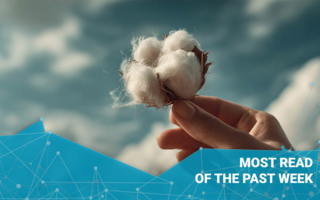16/01/2024 – Bremen Cotton Exchange — auf Deutsch lesen
Challenges in logistics and the cotton of the future
The 01/02 issue of the Bremen Cotton Report has been published. Here is a brief overview of the current state of logistics, an outlook on breeding and agriculture as well as a suspected decrease in cotton consumption in Bangladesh and the dates for cotton classing & testing have been set.
Question time: logistics still susceptible to disruptions
For years, ESF has been actively involved as a member of the Bremen Cotton Exchange in the logistics commission. Since early 2023, Tobias Wetteborn has been leading the company as the new managing director. In an interview with the editorial team of the Bremen Cotton Report, he discussed the impact of the COVID-19 pandemic on logistics, emphasized the increased appreciation for logistics, and explained that stabilized supply chains have brought transport prices back to near pre-COVID levels. Wetteborn predicts growing challenges due to bottlenecks such as the Suez and Panama Canals, as well as risks and challenges in cotton shipping. He highlights the necessity of technological developments, participates in sustainability discussions, and underscores flexibility in cotton logistics.
Session preview: a look at breeding and agriculture
The “Breeding and Agriculture” session of the 37th International Cotton Conference Bremen provides insights into current developments and plans in cotton breeding and agriculture. A focus is on the effects of global climate change on cotton quality, particularly in Turkey. Müge Ekizoglu from the Izmir Commodity Exchange presents research results analyzing the relationships between climate variables and cotton quality. The quality of cotton reacts differently to climate influences depending on the region and developmental stage. Abhijeet Sharma from BASF introduces the traceability platform “Seed2Sew”, making the entire manufacturing process from cotton cultivation to finished textiles transparent. The platform utilizes Hyperledger, an energy-efficient blockchain system, that enables multi-stage verification of data. Field experiments with five farms demonstrate the potential of 5,000 bales of cotton, which could produce six million T-shirts. The CO2 footprint of the production process is 6.26 kg CO2 equivalent per kg of cotton fibers. Filipe Natalio from the Israeli Weizmann Science Institute in Israel presents fluorescent cotton as a sustainable alternative to chemical dyeing processes. His research aims to understand natural mechanisms to develop cotton with tailored properties. Natalio outlines a roadmap for implementing this goal based on a proof-of-concept demonstration.
Bangladesh: cotton consumption to decline
Bangladesh´s textile industry reached a record export of US$ 47.6b in the fiscal year 2022/23, driven by increased orders and higher product value. However, the U.S. Foreign Service predicts an 11.4% decrease in cotton consumption in 2023/24 due to economic challenges. Yarn and fabric manufacturing are also expected to decline. Despite these decreases, cotton production remains stable, with Bangladesh aiming to cover 10% of its needs through domestic production.
(Source: USDA/FAS, Gain Report, November 2023)
Cotton classing & testing training dates
The ICA Bremen course will take place from May 7th – 14th, 2024. Registration for the comprehensive six-day training is now available here.
For more detailed information please see Bremen Cotton Exchange – Report No. 01/02 – 12 January 2024




